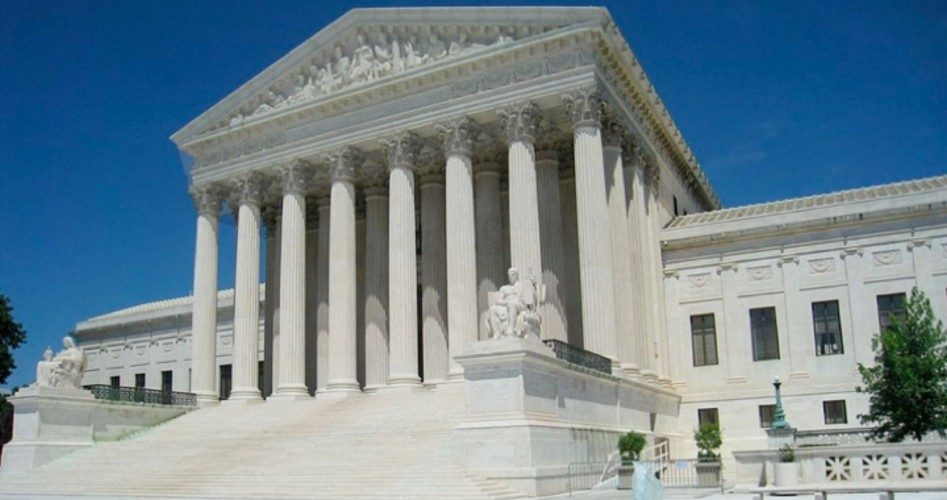
The U.S. Supreme Court dealt a blow to unions and yet another blow to the Tenth Amendment in the 5-4 decision of Harris v. Quinn. The June 30 decision struck down an Illinois state mandate that home-care “personal assistant” workers for the temporarily disabled pay the labor union “agency fees” for collective bargaining purposes even if they are not union members.
The five justices appointed by Republican presidents ruled that “The First Amendment prohibits the collection of an agency fee from Rehabilitation Program [personal assistants] who do not want to join or support the union.” Personal assistants are persons who help disabled people in need of assistance who, without that assistance, would require institutionalization. Personal assistants perform non-medical household tasks for those permanently disabled, or those on temporary rehabilitative programs, and the “personal assistants” of the disabled are often family members.
The Illinois state manual on personal assistants tells the disabled that “you are the employer” to the recipient of the care, though it also says that “the State reserves the right to condition any future funding based on credible allegations concerning your welfare or safety.” State law regarded the disabled as the employers in every legal sense until 2003.
Personal assistants voted to unionize after former Illinois Governor Rod Blagojevich (who was later convicted of bribery charges and impeached on unrelated charges) issued an executive order in 2003 to consider personal assistants state employees for the purposes of collective bargaining. The legislature placed its imprimatur on the executive order with legislation a few months later.
The executive order was a political favor to the Democratic Party’s most vocal union voice, the Service Employees International Union (SEIU). The SEIU has already donated more than $4 million to Democratic candidates in the current election cycle. The court estimated that the SEIU takes in $3.6 million annually from more than 20,000 personal home-care assistants in Illinois alone, amounting to as much as $180 in dues per person annually. The SEIU is among the most politically active left-wing unions, but the Harris decision was not at all about dues going to political activity — not that one could tell from the opinion of the court.
Associate Justice Samuel Alito — who wrote the opinion of the court majority — explained that the case decided “whether the First Amendment permits a State to compel personal care providers to subsidize speech on matters of public concern by a union that they do not wish to join or support.” He concluded it did not. But the kind of speech Alito was talking about was the speech in collective bargaining, and not the political advertising that the SEIU loves to purchase. The court essentially concluded that SEIU members got little for their union membership:
Illinois deems personal assistants to be state employees for one purpose only, collective bargaining, but the scope of bargaining that may be conducted on their behalf is sharply limited. Under the governing Illinois statute, collective bargaining can occur only for “terms and conditions of employment that are within the State’s control.” Ill. Comp. Stat., ch. 20, §2405/3(f). That is not very much.
But the dissent by the four justices appointed by Democratic presidents countered that “Because of that bargaining, as the majority acknowledges, home-care assistants have nearly doubled their wages in less than 10 years, obtained state-funded health insurance, and benefited from better training and workplace safety measures.” The majority countered that there was no evidence these increases were a result of union activity, and may have been a result of natural market forces.
The dissent, written by Associate Justice Elena Kagan, charged the majority with diverging from the judicial principle of stare decisis, the idea that a principle once decided by the court must be decided again the same way to promote the idea of fairness (i.e., precedent). The dissent specifically pointed to the 1977 case of Abood v. Detroit Board of Education, which upheld “agency fees” for non-union member teachers in Detroit to cover the cost of collective bargaining.
Kagan and the three justices who joined her stressed that they had no problem abridging the rights of freedom of association of minority workers who chose to avoid union membership: “Our decisions have long afforded government entities broad latitude to manage their workforces, even when that affects speech they could not regulate in other contexts. Abood is of a piece with all those decisions.”
In short, union thuggery was given a blow in this decision, but so was both precedent and the Tenth Amendment. The Tenth Amendment — ignored entirely by both the opinion of the court and the dissent — reads that “The powers not delegated to the United States by the Constitution, nor prohibited by it to the States, are reserved to the States respectively, or to the people.” Of course, nothing in the U.S. Constitution or amendments gives the federal government power to regulate how states manage their employees. And the First Amendment merely enacts a prohibition on “Congress” from passing a law abridging freedom of speech and association. It says nothing about the states.
None of the justices appealed to the Tenth Amendment as a reason for staying out of state government business. The majority simply quoted Roosevelt Supreme Court appointee William O. Douglas stating that a union dispute “is germane to the exercise of power under the Commerce Clause.” That was the extent of discussion on constitutionality and delegated powers. The “commerce clause” gives Congress authority only over regulating commerce “among the states,” however, not commerce by the state governments themselves.
The precise partisan split in the decision of the court, together with the political bent of the union involved, is likely to turn some heads. The Harris v. Quinn decision is likely to be the centerpiece of the case that the court has turned into a partisan vehicle.



